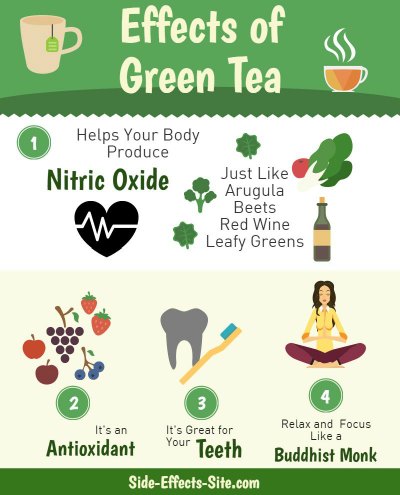Green Tea Side Effects Are
The Secret of Buddhist Monks
Green Tea Side Effects have been praised worldwide for their benefits and ability to dramatically improve health. Is it true what we’ve heard? Some of these side effects of green tea are interesting, but keep in mind they have the potential to be beneficial, but whether the properties of green tea are beneficial or harmful will likely depend upon your body chemistry and what you are looking for green tea to do for you.
You might have heard about green tea in the health news, with the claims that it’s an antioxidant powerhouse, aiding brain function and concentration, increasing fat loss, and even decreasing the risk of cancer.
But are these claims really true and do they outweigh the risk of green tea side effects? We’ll explore whether you’ll want to avoid this common tea, or begin to add this so-called ‘superfood’ to your daily health routine, or even just drink it because you enjoy it!
So how do green tea’s powerful antioxidants and nutrients really affect our body? Keep reading to find out.
The Benefits of Caffeine
Without the Jitters
Probably the most commonly known of the green tea side effects are its stimulant activity. Although green tea does have a very small amount of caffeine, its primary stimulant is an amino acid called L-theanine. L-theanine is not only a much milder stimulant than caffeine, but it also reacts completely differently with our body chemistry than other stimulants and can even counteract some of the negative Caffeine Side Effects some experience when drinking coffee.
"The performance benefits of tea
were identified
[as]: improved attention...improved self-reported
alertness and arousal... [and] showed
beneficial effects in related areas such as work
performance and creativity"
Acute effects of tea consumption on attention and mood
L-theanine is a natural amino acid that is able to cross the blood-brain barrier and trigger the brain to create Alpha waves, on an EEG that cause an alert relaxation. It also stimulates the neurotransmitters GABA and dopamine, which promotes relaxation and anti-anxiety(5). Psychology today published a long article on the Benefits of Alpha Waves , but they fail to mention the fact that green tea side effects can help you to attain these beneficial brain waves more easily.
In effect, this is what distinguishes a coffee buzz from mild tea buzz (4). Green tea, particularly Matcha green tea, is most well-known for being used by Buddhist monks when they meditate to keep them in a state of relaxed alertness, the alpha state, while they engage in long hours of meditation. Coffee simply does not provide these types of benefits, but often makes you jittery and wired, then makes you crash, instead of giving you a sustained alert and relaxed state.
Nitric Oxide Production
One of the lesser known green tea side effects is nitric oxide production, but you shouldn’t be worried. This is actually a good thing and people pay good money to buy nitric oxide supplements when they could just be drinking green tea instead! Aside from being a supplement, Nitric oxide (NO), not to be confused with Dental Nitrous Oxide, is an amino acid that is produced naturally in our bodies and plays a role in helping to fight inflammation, contributes to heart and blood pressure health, stimulates the immune system, and protects the stomach lining (1) (2) (3).
Green tea is one of the many food substances, along with foods like arugula and beets, helps to promote our body’s own production of nitric oxide. Unfortunately, if you use antibacterial mouthwash or take Acid Reflux Medication, the body is no longer able to produce the beneficial nitric oxide you get from these foods.
Along with the benefits of theanine over caffeine, together, these seem like pretty good reasons to switch from coffee to green tea… and to avoid Acid Reflux medicine and Antibacterial Mouthwash. In fact, next we’ll discuss why you might want to use green tea AS your mouthwash, like we do.
Do Green Tea Side Effects
Put Your Teeth at Risk?
Additionally, green tea has been shown to be quite beneficial for dental health as well, as we discuss on the page entitled Macha Tea for Dental Health, Fact or Fable? There are particular antioxidants in green tea, known as epigallocatechin gallate (EGCG) and catechins, that discourage specific bad bacteria in the mouth.
Although green tea is not effective against all bacteria, it has shown to selectively decrease the amount of the cavity, gingivitis, and periodontal disease-producing Streptococcus mutans and Porphyromonas gingivalis bacteria in the mouth, while leaving the Good Bacteria, like the ones that produce nitric oxide, to keep doing their jobs at protecting your mouth and your body as they are supposed to.
Green tea is so good as a mouth rinse that in peer-reviewed scientific studies, green tea has beaten the ‘Gold Standard’ known as Chlorhexidine Mouthwash. Considering that not only is green tea better for cavity and periodontal disease preventing than antibacterial mouthwashes, and that the antibacterial mouthwashes actually DECREASE nitric oxide production in the body, you might consider changing to green tea as a substitute to the commercial mouthwashes. That’s what we use, and the feeling in our mouths in the morning has significantly improved from when we used ‘drug store’ mouthwashes or hydrogen peroxide.
What's Hiding In Your Green Tea?
Every time you see a health report on TV, you hear about antioxidants. But what are they and why should you care? Antioxidants are substances in foods that help to protect our cells from free radicals which cause cancer, chronic illnesses, and aging (7).
Green tea has antioxidants like flavonoids and catechins in abundance that help to protect us from these chronic problems that we’d all like to avoid (6). These powerful bioactive compounds can even protect delicate neurons in the brain, decreasing the risk of developing Alzheimer’s disease and dementia(7). No one can complain about those green tea side effects!
Matcha Tea, in particular, contains up to 10 times the amount of antioxidants as regular green tea, without having 10 times the green tea side effects. It’s a strong flavor that may take getting used to, but it’s definitely a ‘superfood’ that can be used as a drink by itself or even added into smoothies. I’ve done some reviews on Matcha teas on the Matcha Tea for Dental Health page and the Matcha Tea, an Antioxidant Powerhouse page if you’re interested in seeing how different varieties of matcha stack up for flavor and drinkability.
While you normally want to AVOID side effects, you might want to enjoy the side effects of green tea, and you might even benefit from them in a variety of ways.
References
- The regulatory role of nitric oxide in proinflammatory cytokine expression during the induction and resolution of inflammation
- Green Tea Inhibits Human Inducible Nitric-Oxide Synthase Expression by Down-Regulating Signal Transducer and Activator of Transcription-1 Activation
- A Constituent of Green Tea, Epigallocatechin-3-gallate, Activates Endothelial Nitric Oxide Synthase by a Phosphatidylinositol-3-OH-kinase-, cAMP-dependent Protein Kinase-, and Akt-dependent Pathway and Leads to Endothelial-dependent Vasorelaxation
- L-theanine, a natural constituent in tea, and its effect on mental state.
- The effects of L-theanine, caffeine and their combination on cognition and mood.
- Oxidative Damage and Cancer
- Neurological mechanisms of green tea polyphenols in Alzheimer's and Parkinson's diseases.






